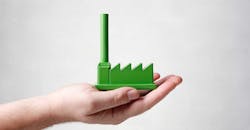A commitment to outside standards can demonstrate to a manufacturer's supply chain members that the manufacturer is committed to upholding environmental sustainability.
"One thing we have here is, we're ISO (International Organization for Standardization) certified with 14001," says Ginger Butz, director of product lifecycle management at Morey Corp. The ISO 14001 standard sets the criteria for an environmental management system. Yearly audits keep businesses honest and their customers satisfied.
"Being ISO 14001 [certified] is certainly a value add for us, because customers then know that we have continuous improvement programs for environmental controls," says Butz.
According to the U.S. Green Building Council, buildings account for 38% of all American carbon dioxide emissions and 73% of the United States' electrical consumption. In order to mitigate this, the Council created LEED, which stands for "leadership in energy and environmental design." It's currently "the most widely used green building rating system in the world," according to their website.
Natura Life + Science, a cannabis contract manufacturer, is currently in the process of building a 12-acre campus in Sacramento and has applied to have the building LEED certified. The building features a growing area with a translucent roof that is 15 to 18 times more efficient than a comparable indoor operation.
Craig Powell, Natura's chief operating officer, said that, although efficiency was among their goals, they didn't initially set out for LEED certification. "Honestly, once we were into the design process, we looked up one day and wondered… what could we do on the basis of LEED?"
What makes Powell's plant different now that it's aiming for LEED certification? Small things, he said.
"The fixtures in the bathroom, the plumbing fixtures, will end up being different as a result of LEED certification. We'll end up using less water." LEED's website says that buildings use 15 trillion gallons of potable water a year, or 13.6% of potable water used in the United States.
Powell pushed back on the idea that getting LEED certification is burdensome or "unreasonably expensive."
"I would just tell you, that's not been our experience," he says. "Our experience has been most of the principles involved in LEED were synchronous with what we were trying to accomplish with the design of our facility."
Powell also echoed Butz's claim that adopting outside environmental standards is a good way to show others that a manufacturer is serious about sustainability.
"I think it sends the right message to the stakeholders involved. By that I mean investors, employees, members of the community where the facility is going to reside, customers… I just think it really is a demonstrable way of showing those stakeholders that we're really serious about sustainability and that we literally put our money where our mouth is."
About the Author
Ryan Secard
Associate Editor
Ryan Secard joined Endeavor B2B in 2020 as a news editor for IndustryWeek. He currently contributes to IW, American Machinist, Foundry Management & Technology, and Plant Services on breaking manufacturing news, new products, plant openings and closures, and labor issues in manufacturing.
